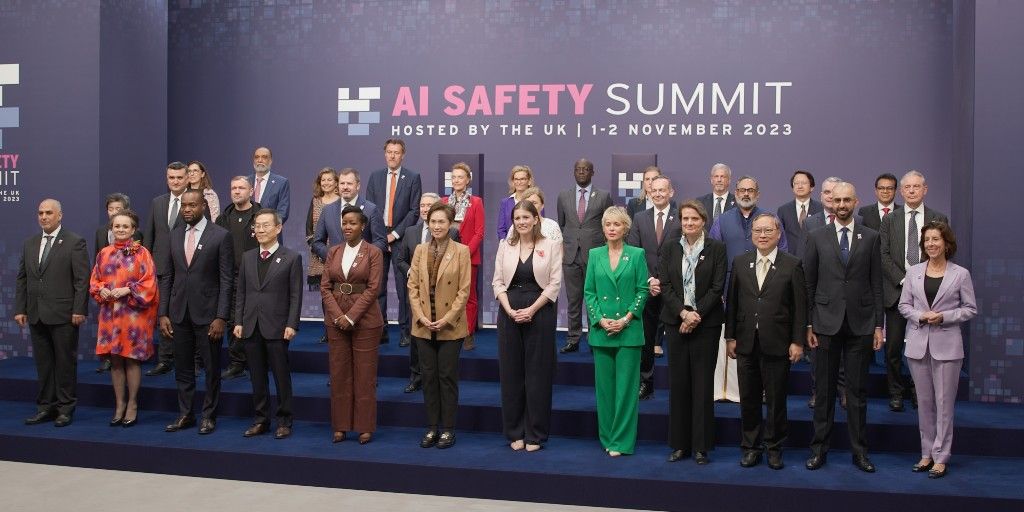Nigeria, Kenya and Rwanda to ensure AI safety with 'The Bletchley Declaration'
Among the 28 nations that have pledged to address AI-related risks through 'The Bletchley Declaration,' only Nigeria, Kenya, and Rwanda represent the African continent.

Three African nations—Nigeria, Kenya and Rwanda—have signed the “Bletchley Declaration”, a joint commitment to tackling the risks of artificial intelligence (AI), alongside 25 other countries including the US and UK. Notably, all three countries are ranked among the top ten African governments most ready for AI.
The world first’s agreement on tackling AI risk was inked during the AI Safety Summit hosted by the UK government at Bletchley Park in England. “This is a landmark achievement that sees the world’s greatest AI powers agree on the urgency behind understanding the risks of AI–helping ensure the long-term future of our children and grandchildren,” says Rishi Sunak, UK’s prime minister.
During his speech at the summit, 'Bosun Tijani, Nigeria’s minister for digital economy said “AI at its very core offers our generation a historical opportunity to create ubiquitous access to insights and intelligence for global development. However, we must remain conscious of the need to ensure the safe ethical and inclusive development of this phenomenon.”
It was an honour to speak at the @AISafetySummit 2023 in the UK earlier today alongside other ministers of ICT. The summit is a gathering of global stakeholders including governments, leading AI companies, experts in research and civil society groups.
— Dr. 'Bosun Tijani (@bosuntijani) November 1, 2023
As a nation of innovators… pic.twitter.com/poYPW1YcLg
Since he assumed office, Tijani has continued to advocate for the use of AI on a larger scale to boost Nigeria’s international competitiveness. In August, he disclosed his plan to establish a comprehensive national AI strategy in the country, a move that was started by his predecessor.
In October, Nigeria launched the AI Research Scheme to provide 45 local startups and researchers with grants worth ₦5 million to build a sustainable AI ecosystem in the country. “As a nation of innovators and entrepreneurs, Nigeria must recognise the significance of Artificial Intelligence and the urgent need to explore and use it for the good of humanity,” Tijani said.
In contrast, Rwanda has surpassed Nigeria in AI initiatives. In April 2023, Rwanda became one of the few African countries to devise a national AI policy with six key areas of focus, encompassing AI literacy, infrastructure, data strategy, AI integration in both public and private sectors, and ethical implementation. The East African country has earmarked approximately $76.5 million for the policy's implementation over the next five years.
“The policy represents a significant milestone in the launch and development of Rwanda’s AI ecosystem and is a critical step towards achieving our national development goals. We are positioning ourselves to become the leading destination in Africa for experimenting with and developing trustworthy AI technologies contextualized for the African continent,” says Paula Ingabire, the Rwandan minister of ICT and innovation.
Recently, Tunisian-born and London-headquartered AI startup, InstaDeep announced Rwanda as its AI research hub in Africa. According to Arnu Pretorius, InstaDeep’s head of AI research in Africa, “Rwanda is at the forefront of policy, with the recent example of hosting a top AI global conference–ICLR–for the first time in Africa.”
For Kenya, signing 'The Bletchley Declaration' is a renewed commitment to tackling the existing AI-related risks in the country. Two months ago, the Kenyan government barred the eyeball-scanning Worldcoin cryptocurrency project by Open AI from recruiting new customers as it investigates data privacy and security concerns.
Similar to Nigeria, Kenya has not yet established an official national AI strategy or regulatory framework. Presently, the country depends on preexisting legislation, such as the Data Protection Act of 2019, to address matters concerning this technology.
“If Kenya wants to leverage the next generation of ICT systems for development, it needs to ensure its approach to AI and other emerging technologies is both carefully thought out and inclusive. A balanced approach to AI depends on nuanced analysis and appropriate legal and regulatory scaffolding,” according to Bulelani Jili, a Meta Research Ph.D. fellow at Harvard University.
Who signed 'The Bletchley Declaration'?
The Bletchley Declaration has been signed by a diverse group of countries, including Australia, Brazil, Canada, Chile, China, the European Union, France, Germany, India, Indonesia, Ireland, Israel, Italy, Japan, Kenya, the Kingdom of Saudi Arabia, the Netherlands, Nigeria, and the Philippines.
Others include the Republic of Korea, Rwanda, Singapore, Spain, Switzerland, Türkiye, Ukraine, the United Arab Emirates, the United Kingdom of Great Britain and Northern Ireland, and the United States of America.
“We have always said that no single country can face down the challenges and risks posed by AI alone, and today’s landmark Declaration marks the start of a new global effort to build public trust by ensuring the technology’s safe development,” Michelle Donelan, UK’ technology minister, said.







Comments ()